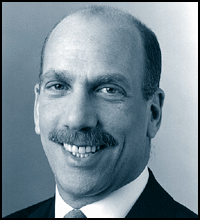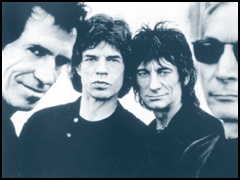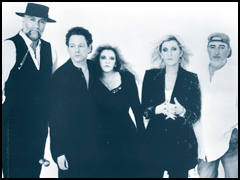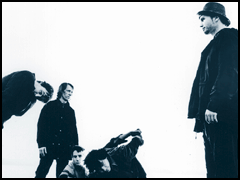![[Sidebar]](/standard/image/sidebar.gif)
![[Features]](/standard/image/headers/features_header.gif)
Concentrated rock
SFX Entertainment is buying up the nation's concert industry. What will the slide toward rock monopoly mean for those who play -- and go see -- live music?
by Ted Drozdowski
Robert Sillerman
AS THE ATOMIC bomb changed the world, so the explosive emergence of a new concert-business conglomerate threatens to transform the $1.3 billion live-music industry. A half-billion-dollar spending spree has made SFX Entertainment a superpower -- the first nationwide concert promoter. And when the mushroom cloud of its birth clears and the giant begins flexing its muscle, the shock waves may affect everyone from booking agents to artists to competing promoters and -- most important -- you.The man behind SFX Entertainment is power broker Robert Sillerman, an entertainment-biz wizard who amassed a fortune's worth of radio stations, sold them off last year, and then began systematically buying a half-dozen of the country's best-run, most powerful independent concert-promotion companies. When those acquisitions were completed this month, SFX was suddenly in control of a national web of 42 major concert venues and more than 100 clubs and small theaters.
Now SFX indisputably dominates the concert market. It has the clout to book a major national tour for a star as big as Alanis Morissette -- who will hit the road this summer -- with a single phone call. That's could bring a staggering end to business as usual -- to a 30-year history of booking agents' haggling with a series of regional promoters throughout the US to arrange such tours, and to those agents' and promoters' getting their piece of the pie. And as a publicly held company with a need to recover its huge recent investments and drive up its stock price, SFX Entertainment is expected to be aggressive.
No wonder booking chieftain Tom Ross, director of the music division at Creative Artists Agency, one of the world's biggest representatives of artistic talent, recently delivered an alarmed and fiery denunciation of SFX. No wonder some promoters who share borders with SFX in the turf-obsessed concert business are fortifying their interests, while others are rumored to be angling for an SFX buyout.
Even the powerful Don Law, New England's largest concert promoter, is, in the words of one source, feeling "the hot breath of SFX on his neck." The Don Law Company has aggressively dominated the New England market for years. His last
Don Law
serious competitor was Rhode Island-based promoter Frank J. Russo, whom Law bought out in 1992. Now, industry insiders speculate about SFX buying Law's operation. SFX has purchased Connecticut's premier live-concert site, the 25,000-capacity Meadows amphitheater, in Hartford, and has an option to buy downtown Boston's Opera House. The latter purchase would give SFX a valuable site for rock concerts, theater, opera, and other productions in Law's own backyard. So Law, who recently changed the name of his company to Blackstone Entertainment, has raised the barricades. He has diversified his investments, brought in the wealthy Boston-based entrepreneur David Mugar as a partner, and made plans to increase the volume of his NEXT ticketing operation.Ticketing is another arena where a market-share battle with SFX will be fought. That business -- worth hundreds of millions of dollars -- has been dominated nationwide by TicketMaster for years. TicketMaster sells 60 million tickets annually for everything from national park campsites to last summer's Lilith Fair tour -- with lucrative service fees attached. You might recall that in 1995, Pearl Jam went to war with TicketMaster, spearheading an antitrust suit against the Goliath and attempting to play only those venues without TicketMaster affiliations. The band lost on both counts when the feds dismissed the suit as groundless and the tour fizzled out because promoters and locations were unprepared to handle the magnitude of Pearl Jam's concerts.
SFX will prove a tougher adversary. One of its acquisitions, the St. Louis-based Contemporary Group, operates its own highly successful regional ticketing operation. In keeping with its aggressive, stock price-driven strategies, SFX investor relations director Tim Klahs says, the conglomerate is looking to use Contemporary's expertise to challenge TicketMaster.
What SFX Entertainment's clout and its potential economies of scale mean for us concertgoers is unclear. But one troubling element of SFX's ascent is its link to the Marquee Group. SFX-man Sillerman is also chairman of Marquee, a New York- based agency that, among other activities, brokers corporate sponsorship deals for arenas. Such big-dollar sponsorships, which Klahs says SFX is ardently interested in expanding, typically deliver blocks of the best seats into the arms of the companies that shell out dough for logo placement. That leaves average ticket-buyers farther back in the stands.
A grand entrance
Last year was easily SFX's biggest one, but the company has been around since 1992, when Sillerman established SFX Broadcasting to consolidate the ownership of his nationwide roster of radio stations. During 20 years of acquisitions, Sillerman had amassed 71 stations, which he sold in August 1997 to the Dallas-based investment company Hicks, Muse, Tate & Furst. The price tag: $1.1 billion.
With his coffers filled, Sillerman went on a carefully orchestrated buying spree. By the time the year was up, he'd spent $449 million on seven companies. The largest purchase was Houston's PACE Entertainment, at $130 million. Sillerman paid $65 million for the San Francisco-based promoter Bill Graham Presents. He also acquired New York's Delsener/Slater; Fisher, Indiana's Sunshine Promotions; Atlanta's Concert/Southern Promotions; and St. Louis's Contemporary Group. And he bought the research/publishing/promotions company SJS Entertainment/Network Magazine Group, of Los Angeles.
Sillerman's goal is to build SFX Entertainment into what biz-school types call a "vertically integrated" company. Observers including Gary Bongiovanni, editor in chief of the live-concert industry bible Pollstar, note that Sillerman has been building up in-house expertise in virtually all aspects of the concert business. Which means that SFX has within its vast grasp the ability to promote and produce shows, book tours, manage and book artists, cut deals on its purchases of concession goods and other supplies, and sell tickets.
Sillerman has been making alliances well beyond the concert-promotion business that give SFX Entertainment even more horsepower. His Marquee Group is an agency founded by former Madison Square Garden president Robert Gutkowski that represents artists and broadcasters, and provides event management. In 1997 Marquee purchased QBQ Entertainment, a small but powerful booking company that handles Billy Joel, Luther Vandross, and -- according to Bongiovanni -- the entire
Q-Prime Management roster, which includes Madonna, Metallica, and Courtney Love. The Marquee Group is also a leader in developing corporate sponsorship for arenas. Last year it reportedly brokered a $100-million-plus, 20-year deal with the Staples retail chain that allows the office products company to place its name on the new sports arena being built in Los Angeles.
And that's not all. Houston's PACE, for example, is an industry leader in coordinating national tours and festivals. PACE has assembled huge and successful road packages since the arena heyday of ZZ Top. The promoter oversaw last year's Fleetwood Mac reunion jaunt -- one of 1997's top arena-size draws, with a gross take of more than $22 million. And right now PACE is launching the George Strait Country Music Festival stadium tour, scheduled for March through June, and structuring a Michael Bolton and Wynonna package for summer.
Just last month rumors began circulating that SFX was poised to acquire heavy-hitting booking agency Monterey Peninsula Artists. Monterey's roster includes such powerful draws as Aerosmith, Phish, Indigo Girls, Blues Traveler, Live, Fiona Apple, and the Mighty Mighty Bosstones. Monterey's principals deny an impending sale. However, Pollstar has reported that SFX's Delsener/Slater operation and Monterey Peninsula have entered into a long-term agreement with the H.O.R.D.E. Festival founders to produce and book the annual tour.
There's also Contemporary's ticketing operation, plus the SJS/Network group's services covering research and programming for the record and radio industries. Not to mention Marquee and QBQ's management, booking, and sponsorship know-how. Between its acquisitions and its relationships, SFX's possible command of the marketplace is indeed staggering.
How big is big?
Why would SFX want to dominate a business as volatile as the live-concert industry, which is dependent on such out-of-control factors as
Rolling Stones
record sales, airplay exposure, and artists' album-making and touring schedules? The answer is obvious: big bucks.Last year $1.3 billion worth of concert tickets were sold in North America, up from 1996's $1.05 billion and 1995's $950 million. Pollstar magazine reports the record-holding year is 1994, when $1.4 billion in tickets were sold.
Top-dollar concert years usually reflect heavy stadium touring. In '95 and '96, there were no major stadium tours. In 1997, the Rolling Stones and U2 packed the sports forums. Rising ticket prices at indoor arenas and amphitheaters also contributed to the escalating grosses.
The year's top-grossing tour ($89.3 million) belonged to the Stones, who sold 1.5 million tickets in North America and managed to pull in $10.8 million for a single four-night booking at Oakland Stadium. Although U2's stadium jaunt was treated as a failure by the press, it was actually the fifth-highest-grossing
U2
North American tour ever, drawing $79.9 million. The Stones' was fourth-highest. In our own backyard, Fleetwood Mac's September 19 and 20 stand at Great Woods, in Mansfield, reaped a $1,620,725 box-office gross, with tickets priced from $30 to $75.Promoters traditionally have made their money from the profits that remain when artists' fees, advertising, production, and other costs have been paid out of a concert's gross. But that's changed in the major-concert business over the past decade; superstar artists have been able to demand a growing portion of the box-office receipts, leaving promoters to rely on things like concession sales, parking fees, a percentage of merchandising (the artist's sales of T-shirts and souvenirs), and other income sources for their profits. That's another reason why venue ownership and diversification into other aspects of the concert business, such as ticketing, are so important to SFX.
Tim Klahs says SFX has no more major acquisitions scheduled at present. Yet Sillerman has told the radio-industry news magazine The Gavin Report that "I would be stunned if 1998 ended and we were the same company as we are today."
Wall Street moves in
The rise of SFX is only the most recent sign that the concert industry is going corporate. "A lot of smaller promoters have become part of larger companies -- whether a large promoter like Universal has acquired them, or whether it's something like Don Law becoming a partner with David Mugar," says Pollstar's Bongiovanni. "The capital threshold that's required to compete in the industry today is immense."
There was a time when words like corporate and concerts were never spoken in the same sentence. When the rock-concert industry was evolving in the '60s, the typical promoter was a hippie entrepreneur, producing shows out of the love of music and the drive to make a little cash. A few were artist/impresarios like San Francisco's Bill Graham, who was a brass-knuckled
Bill Graham (right) with the Who
businessman but turned the process of presenting a concert into a performance in itself. He sweated details -- like greeting the crowd outside, monitoring sound-equipment quality, tutoring his staff on conduct -- to make sure the overall experience of attending a show was a good value. Graham himself was one of the legendary Fillmore's most interesting attractions.But as the stakes rose, the old-fashioned promoter was replaced by the businessman in much the same way that colorful record-biz pioneers like Atlantic's Ahmet Ertegun have been replaced by hard-nosed number crunchers like Sony's Tommy Mottola. And because of mergers, acquisitions, and shakeouts, today's record industry is dominated by a mere half-dozen major companies: Sony, WEA, Polygram, EMI, BMG, and Universal. The era of music-industry professionals "with vinyl running through their veins," as veteran musician/producer Al Kooper recently put it, appears to be over.
Indeed, corporatization is pervasive today in the major fields of pop-culture entertainment: the highly formatted world of radio from which SFX emerged; TV, with its Big Four networks; the movie business, dominated by seven major studios and a few national theater chains; even Hollywood and Broadway, where production conglomerates put together megadeals.
In his quest for the corporate holy grail of high profits and strong investor returns, Sillerman is a visionary who saw ripe, unplucked fruit in the live-concert industry. "It was a very segmented business that had not taken advantage of its full potential in terms of getting its message out to a highly targeted audience due to capital constraints," explains SFX's Klahs.
A music-biz insider with considerable experience buying and selling businesses offers this simple translation: "I'm sure they see the concert industry as a sort of Neanderthal business that hasn't realized the opportunities inherent in consolidation. They have a much larger view of things. They believe they can roll up all the various parts of the business -- managers, agents, bookers, venues -- and make a lot of money."
Booking agents are sweating
It's the thought of how SFX will make that money that scares even such powerful industry players as the talent-booking organizations Creative Artists Agency and International Creative Management. They're justifiably afraid that SFX now has the clout to bypass booking agents -- to call artists' managers directly and book national concerts for major bands with no agency involvement.
Consider this: with a single phone call to a manager, SFX could book a national tour, cutting out regional promoters and denying them the commissions of 10 to 15 percent or better that booking agencies deduct from artists' fees. It's one-stop shopping, with a cash bonus for artists and their managers.
The music-biz truism is that relationships are everything. But even casual industry watchers who've read books like Hit Men and The Mansion on the Hill know that in this often cutthroat business, all a good relationship will guarantee you is a cup of coffee -- provided there's a buck-fifty in your pocket. And dealing direct with a megapromoter like SFX would yield a hell of a lot more than chump change for artists and their managers.
Let's keep the math simple, real, and small-scale. According to Pollstar, rising stars Ben Folds Five sold out the Club Caprice, in Redondo Beach, California, on November 29. That's 500 tickets at $15 each, for a box office gross of $7500. Let's say the band's take was a modest $5000. Fifteen percent of that -- the theoretical agent's fee -- is $750. Multiply that by 100 dates and that's $75,000, which equals temptation with a capital T.
Now let's say bigger is better, and we do the same calculation for Fleetwood Mac's $1,620,725 gross for two nights at Great Woods. Assuming the mighty Mac
Fleetwood Mac
pocketed the door, 15 percent of that is a little more than $243,000. (Granted, major touring acts usually put a lower cap on agents' fees, but this example illustrates the figures involved.) A mere 10 engagements on that scale, minus an agent's fee, puts nearly $2.5 million in somebody's pocket. A manager's. An act's. SFX's? And remember, SFX has 42 sites coast-to-coast that are capable of hosting such a production.Hence the blazing speech made by Creative Artists Agency music division chief Tom Ross at the Concert Industry Consortium on January 30. "Corporations, suits, Wall Street -- they're going to replace the lot of you," he thundered in what's been the only real public vilification of SFX by anyone of import in the music industry. Indeed, agents who were asked to comment on the record for this story either refused or did not return calls, presumably fearing possible reprisals from the fearsome new giant.
Ross railed against corporate sponsorships at arenas, complaining that "giving a backstage pass to Wall Street" squeezes average-Joe fans out of sports events like the Super Bowl and the best seating on major concert tours. He said he's worried that the quest for bigger concert-industry profits has impeded touring opportunities crucial to the development of new artists, pointing out that fresh talent has always been the business's lifeblood. He gibed that "SFX may stand for Send Funds Federal Express," and chided promoters -- people he's worked with for much of his 30 years in the business -- for selling out.
He also summoned the specter of his own profession's obsolescence. "No one's really sure what's going to happen," says Pollstar's Bongiovanni. "Agents are most concerned because any time a company has the ability to bypass their place within the industry infrastructure, well, there's reason for concern."
But SFX's Klahs responds that the company has no plans to bypass booking agencies. "We will serve different functions at different times," he states. "Sometimes we are the promoters, sometimes we are the ones who book . . . There's no intention to bypass the industry structure that's already in place. We regard what we've created here as an easing of the somewhat trying and often difficult process of having to book an act into a number of locations. We regard our ability to provide one-stop shopping as a plus to the industry as a whole."
Of course, if SFX were to acquire major-talent booking agencies the size of, say, Monterey Peninsula to bolster the already strong roster they have with Marquee and QBQ, the effect could be the same. Those SFX-affiliated companies would have the power to influence talent pricing throughout the industry. Instead of being bypassed, booking agents would be emasculated.
The artists' perspective
Bookers rightly fear SFX's "one-stop shopping" concept because it's not entirely unappealing to managers. "The fewer people who make money off a tour, the better it is for the artist," explains Janet Billig, who represents the Breeders, Lisa Loeb, Cibo Matto, and Lemonheads and has also worked with Nirvana. "Fewer cooks in the kitchen makes for an easier tour. The more people involved, the more diluted the artist's directions about how a concert should be promoted, advertised, and presented -- their more specific needs and requests -- become. Everything gets further diluted with each level of people involved."
However, Billig also sees big negatives. "It'll be harder to break bands. If everything's bottom-line focused, everything will be influenced only by the thought of selling tickets, not developing artists. With that much power, you're a slave to their set of rules. They decide where they'll set a ticket price and merchandising policies and parking prices -- all the things they make extra revenue off of."
"Going over the booking agents' heads. . . . Well, that would shake things up tremendously," says E.J. Devonale of Hard Head Management. "The [SFX-owned] venues and promoters that have established relationships with booking agents could be put in the position of having to go around some of their friends. That's rough. With one company having so much control over so many venues, some bands won't really be able to play. It'll be a yea or nay, and the bands that are lucky will get the exposure, and the company could tack on any service charges [for tickets] they want to."
That's an especially important concern for Hard Head, which handles the developing acts Gov't Mule and Vitapup. Gov't Mule, in particular, are at a point in their career where live-concert exposure is crucial. They've just released their first album on Capricorn, a label with distribution through Polygram, and are being considered for opening slots on several important summer tours.
"The alternative is to try to do it on your own, and we saw what happened when Pearl Jam did that," Devonale says. Indeed, Pearl Jam's '95 tour has to many
Pearl Jam
become emblematic of what happens when a strong-willed music-biz giant gets crossed. The Seattle group's attempt to avoid places affiliated with TicketMaster, to liberate their fans from the tyranny of high service fees, proved so disastrous that it threatened to destroy the band. Pearl Jam's exhausting tour through off-the-path sites resulted in cancellations, unfilled houses, bad production, and the eventual collapse of singer Eddie Vedder from the heat of the battle.Agents aren't the only ones who refuse to buy SFX's promises to play by established rules. The strong regional independent promoters that remain, including Don Law's Blackstone Entertainment, are pulling their wagons in a circle and awaiting SFX's next move. These companies include Universal Concerts, Nederlander, and Avalon Attractions, all in Los Angeles; Larry Magid, in Philadelphia; Arnie Granat's Jam, in Chicago; Bill Silva Presents, in San Diego; and Tom Moffatt, in Honolulu.
Nonetheless, SFX chief Sillerman insists that national touring artists will not be shackled in pacts that require them to play only SFX spaces. "I don't think there will ever be a tour that just plays SFX venues exclusively," he recently told radio watchdog The Gavin Report.
"Certainly, important markets like Boston mandate that artists make appearances in venues we do not control," says SFX's Klahs. "It's going to be business as usual."
Turning tickets into gold
At least that's what Klahs says about the promotion of concerts. The ticket business is another matter. When asked if TicketMaster should be concerned about SFX's interests, an up-front yes is his response. "Clearly the Contemporary Group's ticketing system is an active enterprise. There is overhead here that can be spread across an expanded business. We've invested quite a bit of capital development in that ticketing business."
He continues: "You've got to remember that TicketMaster has had the benefit of relatively sparse competition over the past few years. We look at ourselves as a service organization, and this is an opportunity for expansion."
The stakes here are also sky-high. Let's say there's an average service charge of $2 -- a very conservative estimate -- on every one of those 60 million tickets TicketMaster sells. That's $120 million generated in service charges alone. And TicketMaster's very public battle with Pearl Jam has left the company with a tarnished image that even its pending purchase by USA Networks, for $400 million, isn't likely to shine up.
For concertgoers, this rumble in the music-industry jungle will remain largely behind the scenes. It will probably take a year of operations at the new SFX before any economies of scale or other savings -- including the possible elimination of agents' fees -- could trickle down to the consumer, if that's going to happen at all. And it may take at least that long to see whether SFX makes artist development part of its game plan -- allowing unproven acts to test their mettle in SFX locations -- or shuts them out in favor of guaranteed moneymakers.
Here in New England, we could have one of the best ringside seats in the concert-promotion territory battles. If SFX aggressively goes after Don Law's turf, the signs of their competition are likely to be a proliferation of concerts, more local advertising for SFX events at places like the Meadows and the Hartford Civic Center, additional SFX purchases of New England concert venues, and possibly bargain ticket prices as Don Law and SFX compete for your dollars.
What's certain is that more lines will be drawn in the shifting sands of the concert industry as SFX continues to test its brawn. There will be casualties. Don't look for Don Law's well-fortified Blackstone Entertainment to be among them. But it seems inevitable that bodies will fall somewhere as this new corporate monster claims its own. And maybe more.
Copyright © 1998 The Phoenix Media/Communications Group. All rights reserved.






